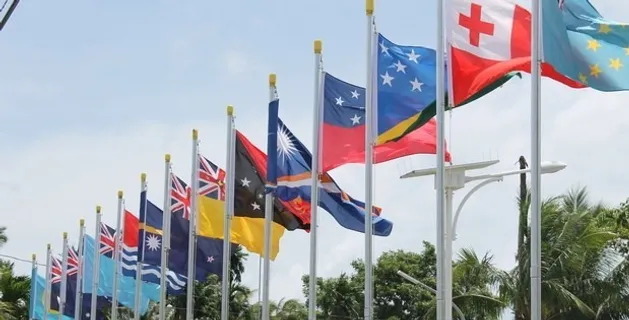The federal government has poured cold water on Guam and American Samoa’s hopes of gaining membership of the Pacific Islands Forum, stating that U.S territories are constitutionally restricted from representing themselves in foreign policy-making bodies.
“Because the United States is not a member of the PIF and because of the political nature and foreign policy aspects of the PIF, the State Department’s position is that it is inappropriate for U.S territories to participate in the PIF independently, in any capacity,” the department said.
The department issued the policy statement in response to the “question periodically posed by the territories,” most recently in the context of whether Guam and American Samoa may join the regional bloc.
Guam petitioned for PIF membership in 2022 but its bid received a lukewarm response from Forum leaders. American Samoa followed suit in February, submitting its application for associate membership.
“By way of background, the State Department does not agree to territories representing themselves in international foreign policy-making bodies given the constitutional principle that the federal government speaks for the United States with one voice overseas,” the policy statement reads.
Guam, American Samoa and the Northern Marianas currently hold an observer status granted by the Forum in 2011 upon the State Department’s request.
Against the backdrop of snowballing geopolitical tensions in the Pacific, the Forum is emerging as the region’s most influential bloc. Washington and Beijing both seek to curry favor with the organisation as they battle for regional dominance.
Palau President Surangel Whipps Jr. said U.S territories in the Pacific are part of a regional grouping that shares the same cultural background and challenges that warrant their admission into the Forum.
“We’re all part of the Pacific family. We should be inclusive. We should all be together. We want to make sure that we’re all about sharing information,”
Whipps said in an interview with the Pacific Island Times at the sidelines of the 15th Conference on Island Sustainability hosted by the University of Guam.
After all, the Palau president added, U.S territories are members of other regional organisations including The Pacific Community and are represented in regional events such as the Festival of Pacific Arts.
On a case-by-case basis, the State Department said it may approve U.S territories’ participation in other organisations “with a technical or apolitical nature,” such as The Pacific Community. However, territorial representatives are restricted from “expressing views on foreign affairs or other issues beyond their competence.”
Residents of U.S territories cannot vote for president and their representatives in the U.S Congress don’t have voting power either.
“A territory cannot represent itself in any international body if the rules of that body do not allow for such participation,” the State Department said in the undated document. “U.S territories would not qualify to be members of the PIF as they are not independent and self-governing Pacific Island countries.”
However, regional observers have pointed out that the Forum’s 18 members include two French territories—French Polynesia and New Caledonia.
Other members include Australia, Cook Islands, Federated States of Micronesia, Fiji, Kiribati, Nauru, New Zealand, Niue, Palau, Papua New Guinea, Marshall Islands, Samoa, Solomon Islands, Tonga, Tuvalu and Vanuatu.
“The United States is not a member and does not participate in the annual Forum meeting but furthers U.S interests by engaging in the PIF Post-Forum Dialogue, which brings together PIF members and 12 other countries that have a strong interest in the Pacific region,” the State Department said.
“In the Post Forum Dialogue, the State Department represents the interests of the whole of the United States, including American Samoa and Guam.” it added.
Whipps pointed out that if French territories could get seating accommodations in the regional bloc despite their non-sovereign status, the Forum should open the doors for U.S territories as well.
“They’re just like Guam and they’re members of the Pacific Island Forum. So,
I believe Guam and American Samoa should join, and the CNMI, if they want to,” Whipps said.
But while standing up for U.S territories, Whipps acknowledged that the U.S government forms part of the equation. “That’s a U.S question— if the U.S will allow that,” he said.














